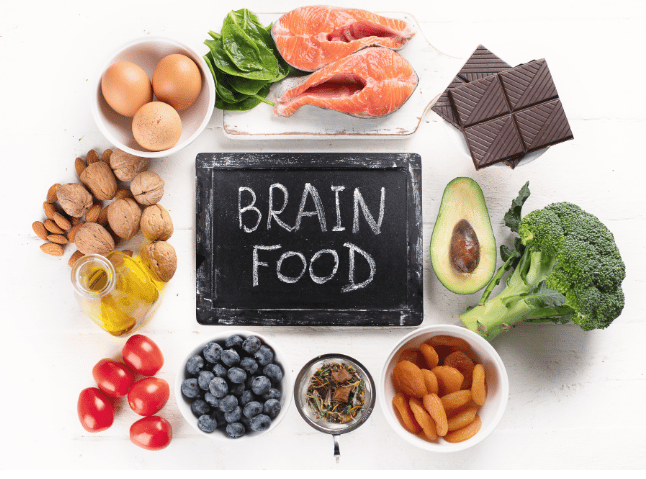10 Best Foods to Boost Cognitive Function and Memory [Complete Guide 2024]
Discover the secrets of foods that support your cognitive function! In this article, we’ll discuss 10 foods that help keep the brain sharp, strengthen memory, and combat cognitive decline. From blueberries to nuts, learn how these foods can help your brain work at its best.
BODY HEALTHBRAIN FOODS
11/11/20244 min read


examples of super foods for the development of cognitive function and brain memory
Cognitive function and memory are two critical aspects of brain health that impact daily life quality. Numerous studies show that the foods we eat have a significant effect on brain function. This article will cover 10 foods that support cognitive function and enhance your memory.
List of Foods That Improve Cognitive Function and Memory
1. Blueberries
Blueberries are rich in antioxidants, especially flavonoids, which are known to protect the brain from oxidative stress.
Key Nutrients: Antioxidants, vitamin C, vitamin K, fiber.
Benefits for the Brain: The antioxidants in blueberries, especially anthocyanins, help reduce inflammation in the brain and protect neurons. Several studies indicate that regular blueberry consumption can improve short-term memory, speed up information processing, and help prevent cognitive decline with age.
How to Consume: For maximum benefits, consume at least half a cup of fresh or frozen blueberries daily. They can be added to smoothies, as a topping for oatmeal, or enjoyed as a healthy snack.
2. Fatty Fish (Salmon, Sardines, Trout)
Fatty fish contain omega-3 fatty acids, especially DHA (docosahexaenoic acid) and EPA (eicosapentaenoic acid), which are essential for brain health.
Key Nutrients: Omega-3 fatty acids, protein, vitamin D.
Benefits for the Brain: Omega-3s aid in forming and maintaining brain cells. DHA is crucial for neural development, particularly in early life, and supports memory and concentration. Omega-3s also help reduce inflammation, which can interfere with neural connectivity.
How to Consume: The recommended intake is two servings of fatty fish per week. Grilled salmon or canned sardines make convenient options.
3. Walnuts
Walnuts are an excellent source of DHA and contain antioxidants that help prevent oxidative damage.
Key Nutrients: Omega-3 fatty acids (DHA), antioxidants, vitamin E, magnesium.
Benefits for the Brain: DHA in walnuts boosts cognition and memory, especially in adults. Vitamin E helps maintain the integrity of brain cells against damage.
How to Consume: Enjoy a handful of walnuts as a snack or add them to salads and oatmeal. Avoid overconsumption due to their high-calorie content.
4. Broccoli
Broccoli is rich in vitamin K, antioxidants, and anti-inflammatory compounds that are beneficial for the brain.
Key Nutrients: Vitamin K, antioxidants, fiber, lutein.
Benefits for the Brain: Vitamin K in broccoli supports neuron health and is known to play a role in enhancing long-term memory. Its antioxidants and fiber also help protect brain cells from oxidative stress.
How to Consume: Steam or roast broccoli to retain its nutrients. Consume in moderate portions twice a week.
5. Pumpkin Seeds
Pumpkin seeds are rich in magnesium, iron, zinc, and copper, all essential for neurological function.
Key Nutrients: Magnesium, zinc, iron, copper.
Benefits for the Brain: Zinc is important for nerve signal transmission, while magnesium helps regulate stress. Iron deficiency can lead to memory loss, while copper is needed to form neurotransmitters.
How to Consume: Enjoy pumpkin seeds as a snack or add them to smoothies, salads, or yogurt.
6. Turmeric
Turmeric contains curcumin, a powerful antioxidant that can cross the blood-brain barrier to work directly in the brain.
Key Nutrients: Curcumin.
Benefits for the Brain: Curcumin is known for its strong anti-inflammatory effects. Research suggests that curcumin can boost the BDNF (Brain-Derived Neurotrophic Factor) hormone, which is associated with improved memory and brain neuroplasticity.
How to Consume: Consume turmeric as turmeric tea or as a spice in dishes. Combine with black pepper for optimal curcumin absorption.
7. Eggs
Eggs are one of the best sources of choline, a nutrient crucial for producing acetylcholine, a neurotransmitter that supports memory function.
Key Nutrients: Choline, vitamins B6, B9 (folate), and B12.
Benefits for the Brain: Choline is vital for cognitive function and memory abilities. B vitamins in eggs aid in energy production for the brain, maintaining nerve health, and fighting brain shrinkage.
How to Consume: Eat boiled eggs, scrambled eggs, or add them to salads.
8. Spinach
Spinach is rich in folate, lutein, and vitamin E, which play a role in protecting and enhancing cognitive function.
Key Nutrients: Folate, lutein, vitamin K, and beta-carotene.
Benefits for the Brain: Folate helps protect against brain aging. Research shows that consuming green vegetables like spinach can help preserve memory as you age.
How to Consume: Blend spinach into smoothies, add it to salads, or stir-fry as part of your daily menu.
9. Dark Chocolate
Dark chocolate contains flavonoids, caffeine, and antioxidants that are great for improving focus and memory.
Key Nutrients: Flavonoids, caffeine, antioxidants.
Benefits for the Brain: Flavonoids in dark chocolate help increase blood flow to the brain, while caffeine enhances alertness and concentration.
How to Consume: Choose dark chocolate with at least 70% cocoa for optimal benefits. Limit consumption to avoid overindulgence.
10. Avocado
Avocados are a source of monounsaturated fats that help maintain healthy blood flow to the brain.
Key Nutrients: Monounsaturated fats, vitamin E, and folate.
Benefits for the Brain: Healthy fats in avocados reduce the risk of hypertension, which can affect blood flow to the brain. Vitamin E also helps protect brain cells from oxidative stress.
How to Consume: Add avocado to smoothies, salads, or as a butter substitute in sandwiches.
Each of these ten foods offers unique benefits for cognitive function and memory, from supporting neurotransmitter formation to protecting the brain from oxidative stress. Integrating these superfoods into your daily diet is a smart step toward long-term brain health. Pair them with a healthy lifestyle, including regular exercise, quality sleep, and stress management, for optimal results.
